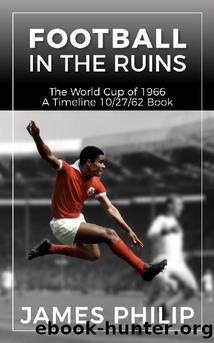Timeline 102762 Football in the Ruins: The World Cup of 1966 by James Philip

Author:James Philip [Philip, James]
Language: eng
Format: epub
Published: 2018-06-07T04:00:00+00:00
14 | Group 4 (Ayresome & Roker Park)
What of referees and sporting officialdom? If the tournament in England changed one thing for the better it was probably that it prompted the authorities to begin the long, painful process that, by trial and error, by which national and international associations â including FIFA in its reconstituted incarnation ahead of the 1970 tournament - abandoned an essentially laisse faire attitude to what went on in matches and became pro-actively involved in improving, then controlling conduct on the field and eradicating the worst excesses witnessed in England forever.
However, in England in 1966 most of the referees and linesmen officiating in most of the matches concerned themselves with blowing up for obvious fouls, watching the offside line, awarding goals and keeping time. To a man they took exception to dissent and the myriad of other forms of disrespect towards them and their dignity and at least two of the five sendings-off and perhaps fifty percent of all bookings were for showing dissent or committing acts of unsportsmanlike conduct (that is, being rude to the referee).
Few referees thought it was their job to protect the footballers in their care, several of whom suffered career-threatening or ending injuries as a result of blatant foul play in the course of the tournamentâs thirty-two matches. If one was to apply modern day standards of officiating professional football matches one might consider that the officials, by any rational standard, lost control of many of the games in 1966. Applying those same standards clearly, only a minority of those 1966 officials were remotely up to the job; many were unfit, either physically or temperamentally and some â probably, judging by the decisions they gave â had a poor or negligible, or if one is being charitable, eccentric understanding of the laws of football.
Not that the standard of refereeing in England was uniformly âtop notchâ at that time; just better than that which the world got to see displayed in the first major global sporting event of the post-cataclysm epoch.
In Group 4 three schools of European footballing culture and that of Colombia clashed; and the Italians, feeling themselves to be playing in a country that was in every way hostile to them adopted the âArgentina model of qualificationâ. To be fair the Italians were markedly less gratuitously violent, their style was to niggle and nip at the opposition rather than to hack and kick at every opportunity and there was never remotely the animus between the Italian side and opposing elevens that there was between say, the Argentines and the Scots.
Portugal were far from the rank outsiders that they were painted before the tournament. The Portuguese had come a long way since they were beaten ten-nil in Lisbon by one of Walter Winterbottomâs first England sides in 1947. Sporting Lisbon and Benfica had been among Europeâs top clubs at the time of the October War[51] and the national eleven boasted talent gathered from all over the crumbling, yet far flung Portuguese empire.
Download
This site does not store any files on its server. We only index and link to content provided by other sites. Please contact the content providers to delete copyright contents if any and email us, we'll remove relevant links or contents immediately.
In Control (The City Series) by Crystal Serowka(35411)
The Wolf Sea (The Oathsworn Series, Book 2) by Low Robert(33918)
We Ride Upon Sticks by Quan Barry(33356)
Crowbone (The Oathsworn Series, Book 5) by Low Robert(32387)
The Book of Dreams (Saxon Series) by Severin Tim(32297)
The Daughters of Foxcote Manor by Eve Chase(22356)
Trainspotting by Irvine Welsh(20141)
Call Me by Your Name by André Aciman(19061)
Shot Through The Heart (Supernature Book 1) by Edwin James(17962)
The Secret History by Donna Tartt(16762)
The Girl from the Opera House by Nancy Carson(15020)
Sad Girls by Lang Leav(13395)
American King (New Camelot #3) by Sierra Simone(13068)
Pimp by Iceberg Slim(12999)
All the Missing Girls by Megan Miranda(12834)
The Betrayed by Graham Heather(11751)
The Betrayed by David Hosp(11724)
4 3 2 1: A Novel by Paul Auster(11118)
Still Me by Jojo Moyes(9963)
